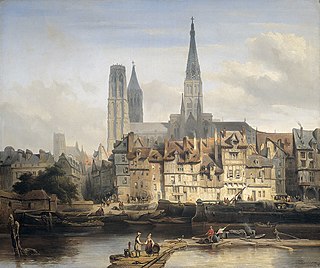Related Research Articles

François Couperin was a French Baroque composer, organist and harpsichordist. He was known as Couperin le Grand to distinguish him from other members of the musically talented Couperin family.
The Couperin family was a musical dynasty of professional composers and performers. They were the most prolific family in French musical history, active during the Baroque era. Louis Couperin and his nephew, François Couperin le grand, are the best known members of the family.
The year 1705 in music involved some significant events.

François d'Agincourt was a French harpsichordist, organist, and composer. He spent most of his life in Rouen, his native city, where he worked as organist of the Rouen Cathedral and of three smaller churches. Highly regarded during his lifetime, d'Agincourt was one of the organists of the royal chapel. The single surviving book of harpsichord music by him contains masterful pieces inspired by François Couperin; also extant are some 40 organ works that survive in manuscript copies.

Henri Desmarets was a French composer of the Baroque period primarily known for his stage works, although he also composed sacred music as well as secular cantatas, songs and instrumental works.
Christophe Moyreau was a French Baroque composer, organist and harpsichordist.

Armand-Louis Couperin was a French composer, organist, and harpsichordist of the late Baroque and early Classical periods. He was a member of the Couperin family of musicians, of which the most notable were his great-uncle Louis and his cousin François.

Abraham Louis Niedermeyer was a Swiss and naturalized French composer.
Marguerite-Antoinette Couperin was a French harpsichordist, the first woman to hold the position of ordinaire de la musique de la chambre du roi pour le clavecin.
Marguerite-Louise Couperin was a French soprano singer and harpsichordist, who came from the musically talented Couperin family dynasty. The Frenchman Évrard Titon du Tillet, in his 1732 book Le Parnasse françois, describes her as "one of the most celebrated musicians of our time, who sang with admirable taste and who played the harpsichord perfectly."
Antoine de Léris was a French journalist and drama critic of the 18th century and a historian of the French theatre, author of the Dictionnaire portatif historique et littéraire des théâtres, contenant l'origine des differens théâtres de Paris,, published without the author's name on the title page by Jombert in Paris in 1754.The corrected and augmented second edition, 1763, is a standard work of theatre history, a "library" of information. "Léris is accounted by many commentators very nearly the equal of François and Claude Parfaict when it comes to painstaking accuracy and responsible commentary," William Brooks observes.
The chapelle royale was the musical establishment attached to the royal chapel of the French kings. The term may also be applied to the chapel buildings, the Chapelle royale de Versailles.

Honoré François Marie Langlé (1741–1807) was a French theorist of music of Monegasque origin, composer, and author of a Traité d'harmonie et de modulation. Napoleon named him to the newly founded Paris Conservatoire.
Francesco Petrini (1744–1819) was a harpist and composer.

Jules Gallay was a French lawyer and music historian.

Nicolas Séjan was a French composer and organist, from a family allied to the Forqueray.
Joseph Wackenthaler was a French Kapellmeister from 1819, an organist from 1833 to 1869 at the Cathédrale Notre-Dame de Strasbourg, and a composer.

Charles-Amable Battaille was a French operatic bass. Appreciated both for his voice and his acting skills, he premiered the main bass roles for the works represented at the Opéra-Comique between 1848 and 1857, and is especially notable as the first singer of the role of Peter the Great in Meyerbeer's L'Étoile du nord (1854).

Louis-Augustin Richer was a French singer, singing professor and composer. He was a member of a family of musicians from Versailles who also had close ties to the family of André Danican Philidor. He gained prominence as a singer at the courts of Louis XV and Louis XVI and also served as Maître de musique for the courts of the Duke of Chartres and the Duke of Bourbon. After the abolition of the monarchy during the French Revolution, Richer became a professor at the Paris Conservatory.

Charles-Henri Plantade was a French classical composer and singing professor. His compositions included several operas, numerous romances, sacred music, and a sonata for harp. He taught singing at the Conservatoire de Paris and was the maître de chapelle to the courts of Louis Bonaparte in Holland and Louis XVIII in France. From 1812 to 1815 he was also the singing master and stage director of the Paris Opéra. Plantade was born in Pontoise and died in Paris at the age of 75. His elder son, Charles-François Plantade, was also a composer.
References
- ↑ Mellers, Wilfrid (2007-03-01). Francois Couperin and the French Classical Tradition. Read Books. p. 152. ISBN 978-1-4067-0684-0.
- 1 2 3 4 Don, Randel (1996). The Harvard Biographical Dictionary of Music. Harvard University Press. ISBN 978-0-674-37299-3.
- 1 2 3 Glaire, J. B. (Jean Baptiste); Walsh, Joseph-Alexis; Chantrel, Joseph; Orse, abbé; Alletz, Edouard (1840). Encyclopédie catholique, répertoire universel et raisonné des sciences, des lettres, des arts et des métiers, formant une bibliothèque universelle, avec la biographie des hommes célèbres; ornée de plus de 3000 gravures dans le texte et refermant le résumé de plus de dix mille ouvrages; (in French). New York Public Library. Paris, P. Desbarres. pp. 576–577.
- 1 2 Fétis, François Joseph (1878). Biographie universelle des musiciens et bibliographie générale de la musique. Suppl. et complément, publ. sous la direction de A. Pougin (in French). p. 209.
- ↑ Bouvet, Charles (1919). Une Dynastie des musiciens français: Les Couperins, organistes de l'Eglise Saint-Gervais (in French). Georg Olms Verlag. p. 109. ISBN 978-3-487-40921-4.
- ↑ Bowers, Jane M.; Tick, Judith (1987). Women Making Music: The Western Art Tradition, 1150-1950 . University of Illinois Press. pp. 197. ISBN 978-0-252-01470-3.
Marguerite-Antoinette Couperin.
- ↑ "Maubuisson Abbey", Wikipedia, 2019-11-14, retrieved 2019-11-30